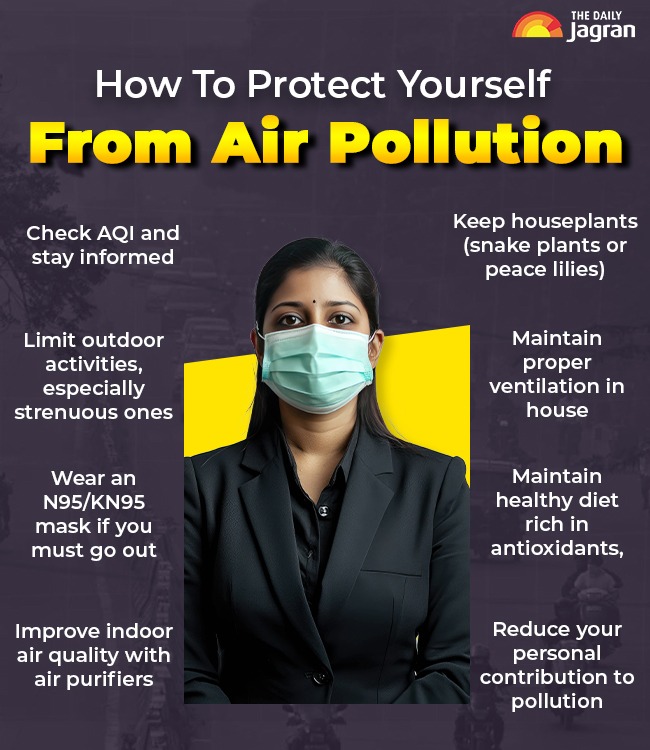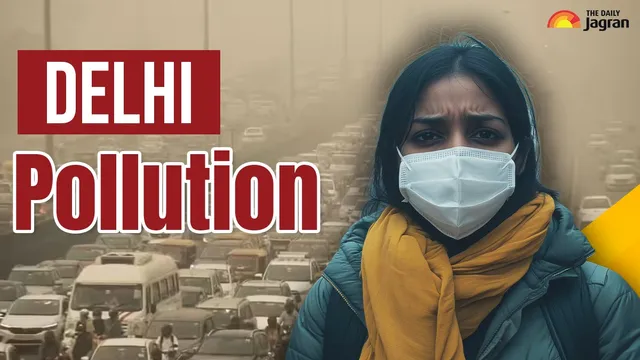- By Yashashvi Tak
- Tue, 11 Nov 2025 03:03 PM (IST)
- Source:JND
Delhiites continued to gasp for air on Tuesday, November 11, as the national capital recorded the worst air quality of the season, with the AQI entering the 'severe' category. The government had to impose Stage III of the Graded Response Action Plan (GRAP) as the Air Quality Index crossed the 400 mark. Under GRAP III, restrictions were imposed on construction work and BS-III petrol and BS-IV diesel vehicles. Further, schools shifted classes up to standard 5 to hybrid learning mode amid rising health risks.
As air quality worsens, people begin to face breathing problems and other pulmonary illnesses. To understand the impact of air pollution on individual health, The Daily Jagran spoke to experts, including Manoj Kumar, Analyst at the Centre for Research on Energy and Clean Air (CREA); Dr Kuldeep Kumar Grover, Critical Care and Pulmonology Head at CK Birla Hospital, Gurgaon; and Dr Ravi Shekhar Jha, Director and Unit Head, Pulmonology at Fortis Escorts Faridabad.
Delhi Air Pollution
Manoj Kumar says the latest Global Burden of Disease (GBD) 2023 data, released by the Institute for Health Metrics and Evaluation (IHME) in October 2025, provides a clear view of Delhi’s health risks. It reflects the city’s continued struggle with pollution-driven disease burden.
An analysis of the IHME data by CREA shows that ambient particulate matter pollution remains the single largest risk factor for deaths in Delhi, accounting for nearly 15 per cent of all deaths in 2023. According to IHME estimates, exposure to ambient air pollution led to approximately 17,188 deaths in the city during 2023. This means that one out of every seven deaths in Delhi is linked to polluted air. The findings highlight how severely air quality continues to affect the health and longevity of Delhi’s residents.
Air Pollution-Related Deaths In India In Past Years
The latest State of Global Air 2025 report warns that polluted air is quietly eroding the nation’s health. It affects lungs and hearts, harms brain function, and worsens chronic illnesses. With nearly 2 million deaths in 2023 linked to air pollution, India continues to bear one of the world’s heaviest disease burdens.
Released by the Health Effects Institute (HEI) and the Institute for Health Metrics and Evaluation (IHME), United States, the report shows a staggering 43 per cent rise in air pollution-linked deaths in India since 2000, when the toll stood at 1.4 million.
In an interview with Daily Jagran, Dr Kuldeep Kumar Grover shared how people can inculcate habits which would protect them from pollution-related ailments. Personal habits which can help reduce exposure to air pollution include:
1. Staying indoors as much as possible
2. Reducing drives and road exposure
3. Avoiding eating outside exclusively
4. Making healthy food choices
5. Wearing an N95 mask
6. Recycling waste and properly disposing of or reusing waste
Dr Ravi Shekhar Jha, pulmonologist at Fortis Escorts Faridabad, told The Daily Jagran that chronic exposure increases the risk of asthma, chronic bronchitis, COPD, allergic rhinitis, lung cancer, and cardiovascular diseases. It also worsens diabetes, neurodegenerative conditions, and can impair a child's lung growth and impact pregnancy outcomes.

Personal Habits To Reduce Exposure To Poisonous Air
Simple behavioural adjustments can significantly limit exposure to the polluted air:
1. Check the AQI before stepping out and plan outdoor activities when air quality is better (usually early morning after sunrise or after rainfall)
2. Keep car windows closed in traffic
3. Avoid open burning and encourage greenery around your home
4. After returning indoors, wash face, eyes and exposed skin, and rinse nasal passages if possible to remove deposited pollutants
Who Are Most Affected By Air Pollution
Children, elderly, pregnant women, and people with pre-existing lung or heart diseases are particularly vulnerable, as their lungs or immune systems are either developing or already compromised. Outdoor workers and traffic policemen also face high cumulative exposure.
(This article is part of the series 'Smog Stories'. To read more articles in the series, click here https://www.thedailyjagran.com/search/Smog-Stories )

